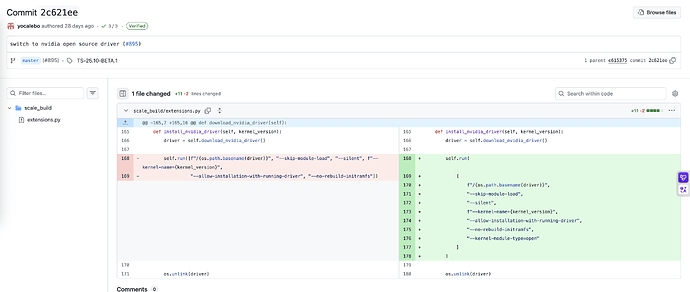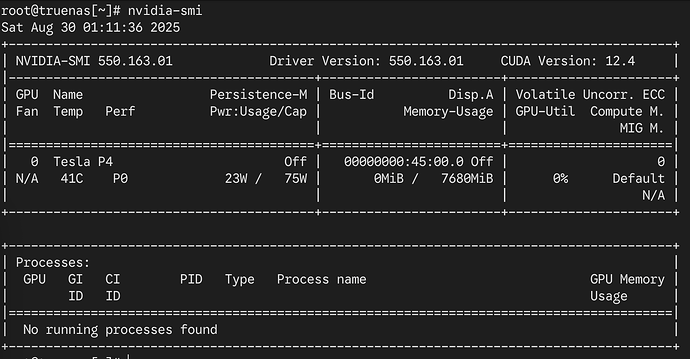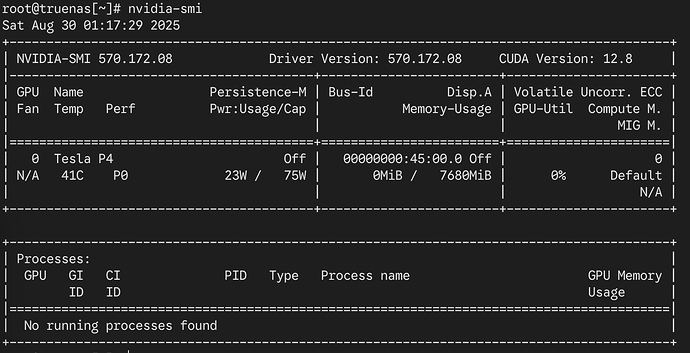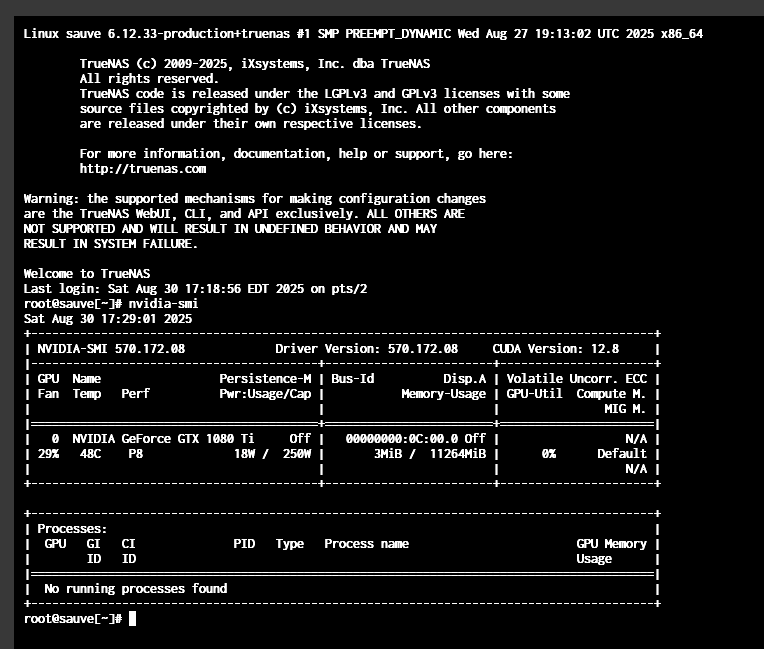Is there really nothing that can be done to support “older” Nvidia GPUs? I have a Tesla P4 that I purchased not that long ago, and apparently that is now “not supported”…
If that’s possible, why isn’t it possible to have it working in the host OS?
Is there really nothing that can be done to support “older” Nvidia GPUs
The Nvidia drivers that support old hardware don’t support the current kernel. The only option here would be for you to either cut your own TrueNAS iso with an older kernel and legacy drivers; or to work with the team that writes FOSS drivers and offer to reverse engineer the functionality of old hardware. If that’s even possible.
Between learning how and doing you are looking at a multi year effort, which begs the question of whether that’s worth it to you.
Is there somewhere I can find some more information about that? I thought there was a proprietary driver that is specifically for older hardware, and then the open source driver which is what 25.10 is moving to. I haven’t seen any news that other Linux based OSes are dropping support for older GPUs, and my assumption was that’s because they are still using the proprietary driver.
Yes, according to the submission log, removing the --kernel-module-type=open parameter and rebuilding should support the old hardware. I am currently testing it and will provide feedback later.
A full VM can use different kmods or drivers entirely - it doesn’t have to share kernel modules with the host like Docker/Apps do.
(Disclaimer: Not an Engineer.)
We ship a pre-compiled sysext including kmods for the ability to quickly enable/disable the driver, as well as maintain compatibility with other components (NVMe Direct IO was a challenge with this interop before, if I’m recalling my Engineering debriefing correctly) and we’d likely have to compile two variants of the ISO - which means far more complexity in the testing of these variants and the upgrade paths.
Removing the parameter and rebuilding the kmod as pointed out by @zzzhouuu should work, as that’s essentially reverting the commit that enabled the open variant, or even cherry-picking a driver and building your own systemd-sysext as posted in the longer writeup from @ChanningHe - but out-of-the-box the 10-series isn’t supported.
I’ve got three cards impacted by this - a P400 and two P4’s - my transcoding card is likely to become an Intel A310, the P4’s are going to move to being VM-isolated or move to a hypervisor.
I suspect the number of people and cards impacted by this will be significantly higher than the number of people want to run 50 series cards in a NAS, which based on the linked threads seemed like a relatively small number.
I guess making the changing and pushing it through is one way to find out, much like what happened with the virtualization changes. Maybe I’ll just wait for 26.04 ![]()
Yay, my Tesla P4 is back! After removing the --kernel-module-type=open parameter, I rebuilt the Nvidia Driver extensions (systemd-sysext), then followed @ChanningHe guide to overwrite the existing driver, and the card is working for me again.
zfs set readonly=off boot-pool/ROOT/25.10-BETA.1/usr
cp nvidia.raw /usr/share/truenas/sysext-extensions/nvidia.raw
zfs set readonly=on boot-pool/ROOT/25.10-BETA.1/usr
For example Resurrecting an onboard Nvidia GPU by downgrading Ubuntu • The Register describes it for Debian 12 and Ubuntu 24.04
thank you this is 100% what i need for my err patched nvidia drivers and hailo8 drivers
Can the team, not give selectable sysext packages or can we find a way to have community developed and maintained sysext packages that would be created with each release?
i made the decision to move to hailo8 card because the coral has been abandoned. have yet to try building a sys-ext package, but give the ealier post i now have more motiviation to figure that out ![]()
Oh. I got the NVIDIA T400 and had to RMA it the same day. Looks like the Intel ARC A310 is on the menu. ![]()
You can modify the code according to the documentation above and compile the graphics driver extension yourself so the card will work; of course, if you trust it, you can also use the one I compiled.
I have a feeling people will be sharing theirs so others don’t have to bother compiling their own very soon, seems like extra steps for nothing lol
I’ve uploaded the compiled extension to GitHub for everyone to test
truenas-nvidia-drivers
Thank you
Love it, worked for me also on my 1080Ti
Still need install-dev-tools for my Coral but that’s another story haha. At least I don’t have to get a GPU on this box
According to the documentation linked in the release notes, it should be possible to install any of the kernel modules (open or proprietary) based on the graphic cards present on the server:
Because the two flavors of kernel modules are mutually exclusive, one or the other must be chosen at install time. By default, installation will choose which flavor of kernel modules to install, based on the GPUs detected in the system. If a pre-Turing GPU is detected, installation will default to the proprietary flavor of kernel modules. Otherwise, installation will default to the open flavor of kernel modules.
Would it not be better if the “–kernel-module-type” flag is not set so that all graphic cards can be supported? Or am I missing something obvious?
Renew, reuse, reduce recycle.
Yes, including this 1080 owner. According to Wikipedia, the card was initially released in May, 2016 although I acquired mine in July, 2018. That card went through three desktops while I had it before ending up in my TrueNAS server to assist with Plex transcoding. The 5060 card 8GB card is slightly faster than the 1080 and is around $300-$310.
So, for the 10XX series of cards, we are talking nine years between initial release and end of life. The end of life also includes the 9xx series which was initially released in September, 2014 and the 7xx series which was released in February, 2013.
I suspect that many hobbyists are reusing hardware for their TrueNAS setups. I can understand that. However, this is a nVidia driver issue, and we had some warning on this.



